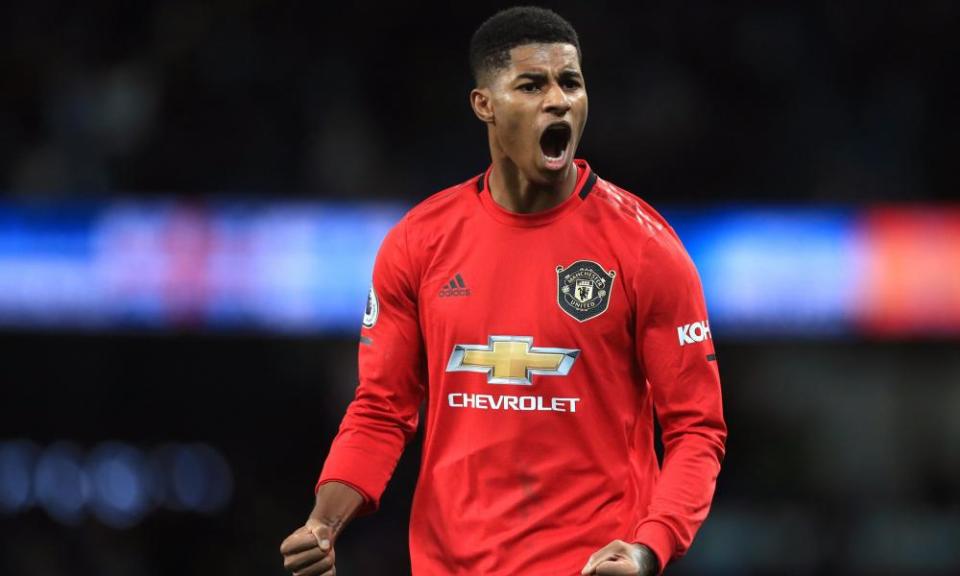Boris Johnson should backtrack on free school meals. But the damage is done

When Marcus Rashford was a boy, he would sometimes hear his exhausted mother crying herself to sleep. She worked full time in minimum-wage jobs to support her five children, but still there wasn’t always enough to go round. As he once put it, “if there was food on the table, there was food on the table”, and if not he didn’t moan about feeling hungry.
When his gift for football became obvious, she wangled him into Manchester United’s youth academy a year early, because it came with catered accommodation; finally, a guarantee that he’d be eating enough through the ravenous teenage years. Rashford got lucky, but knows full well that other children didn’t - and raising millions to combat food poverty has become his way of paying it back.
Related: Lineker and Farage back Rashford's free school meals campaign
Who didn’t cheer when he got his MBE this month, having run an unfailing, courteous, scrupulously non-partisan campaign for free school meal meals to be extended through the summer holidays this year? Yet when he called this week for the food vouchers to continue through half-term and Christmas, the government’s response was a full-frontal political assault on what the new Tory MP for Bassetlaw, Brendan Clarke-Smith, scornfully called “celebrity virtue-signalling”.
As political own goals go, it was a spectacular one. Feeding kids through the winter holidays would only have cost £20m: peanuts in public spending terms; piddling compared with subsidising fancy restaurant meals via the “eat out to help out” scheme.
Ministers must, of course, have worried about the precedent set. They’d have known that what starts with a one-off plea for charity soon becomes a demand for free school meals all year round, for ever. And put like that, the answer becomes – actually, why not? Families who can’t stretch to lunch in term-time don’t magically get any richer in school holidays. If you could relatively easily ensure that kids didn’t go to bed starving, why wouldn’t you? Scotland and Wales duly signed up. Yet English Tory MPs were marched out to defend the indefensible.
Children had been going hungry “for years”, small-business minister Paul Scully said awkwardly on the BBC. The Mansfield MP Ben Bradley tweeted that it was better for kids if their parents didn’t fall into “dependency”. It’s enough to make you miss the patrician Tories of old, who at least understood why some people didn’t like them.
This flint-hearted politics fundamentally misreads the pandemic mood. When times are bleak, we’re tearfully grateful for a kind gesture: the coffee shop owner giving freebies to exhausted nurses; the neighbour fetching shopping for half the street. Anything to lift the gloom.
“Be kind” was New Zealand prime minister Jacinda Ardern’s mantra, encouraging people to support each other through tough times. Joe Biden’s presidential campaign is built around small acts of compassion - clips of him pausing to encourage a small boy with a stammer, or hugging a grieving friend – which appeal to Americans yearning for a leader who actually gives a damn. Kindness isn’t a weakness in this climate, but a strength.
Downing Street should have realised the game was up when wise heads like Richard Holden, new MP for North West Durham, or Harlow’s Robert Halfon, rebelled in the parliamentary vote that Labour triggered on making free holiday food available until Easter. Holden, who abstained, is an ex-special adviser and veteran of many a sticky election campaign; Halfon, who voted with Labour, was championing “white van man’s” worldview inside the Conservative party a decade before anyone mentioned the red wall. Even Nigel Farage says the decision looks “mean and wrong”, for heaven’s sake. Yet at the time of writing, the government is still in a hole and digging furiously.
It’s all very well promising, as Boris Johnson has, that Britain isn’t going back to austerity. But governments are judged on actions, not words, and this one triggers a strong sense of deja vu, with its arguments for children to go hungry lest their parents fail to learn some greater moral lesson.
There’s something wearily familiar too about the Treasury’s refusal to commit to keeping the extra £20 that chancellor Rishi Sunak temporarily added to income support and tax credits during the pandemic – even though withdrawing it next spring would mean a sudden drop in living standards for many red-wall households.
This government hasn’t quite made the ideological leap from its old fiscal doctrine of balancing the books at any cost to something new, which might better reflect their new electoral base’s complex views: resentful of anything perceived as scrounging off the state, but with a soft spot still for hungry kids and the working poor.
There’s a deeper emotional connection between football fans and food banks that ministers seem to be missing, too. What began as a joint venture between Liverpool and Everton supporters five years ago, organising match-day collections for hungry people, has become a grassroots movement across numerous clubs. At least a quarter of food bank supplies on Merseyside are said to have come from matchgoers until Covid closed the stadiums. Newcastle United supporters, annoyed at being asked to pay an extra £15 to watch the big game on pay-per-view TV last weekend, donated the fee to their local food bank instead, raising an estimated £19,000 and spurring other clubs’ supporters to follow suit.
Loyalty to a football club is about belonging, standing up for your own community, being in it together; feelings the Fans Supporting Foodbanks network and Rashford had both harnessed for good. For the government to stomp all over that looks not prudent but mean, and petty with it.
Boris Johnson still could and should change his mind over free school meals; but arguably the damage is already done. It wasn’t just about the money. It was about looking, for once, like they understood.
• Gaby Hinsliff is a Guardian columnist

